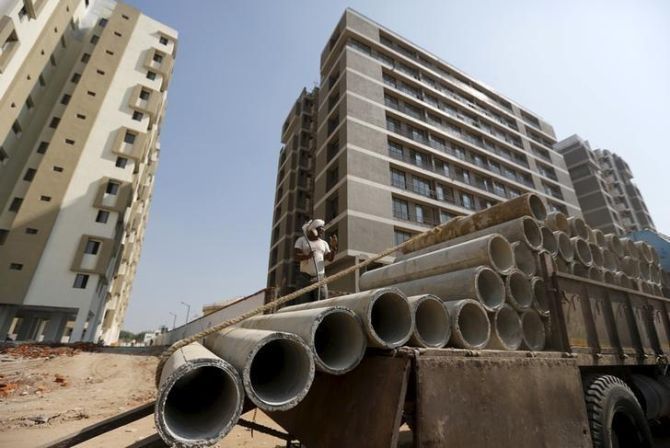Homebuyers should keep IBC as the last resort; if the delayed project is without encumbrances, they should explore self-development, says Tinesh Bhasin.

Builders going to the National Company Law Tribunal is becoming a headache for many home buyers.
And with the Supreme Court holding the status of home buyers as financial creditors, many who are stuck with incomplete projects could soon find themselves being part of the insolvency proceedings. In some cases, it has already started.
For example, a home buyer moved the National Company Law Tribunal (NCLT) against Delhi-based Raheja Developers for delay in possession.
In another case, Bank of India filed a petition against Housing Development and Infrastructure (HDIL). The Mumbai-based realtor has ongoing projects which are delayed.
Buyers in some delayed projects didn't know what to do next.
"If one lender initiates insolvency proceedings against a company, all other projects get affected as all other lenders also have to participate," says Chetan Tandel, a home buyer in HDIL's project at Kurla.
The National Company Law Appellate Tribunal (NCLAT) has, however, stayed constitution of a Committee of Creditors.
The NCLT may not necessarily be the best option for buyers always, especially if the project is small and close to completion.
Instead, buyers should explore the possibility of self-construction through the real estate regulator in their state.
"The Insolvency and Bankruptcy Code (IBC) is not a recovery platform. Its role is not to enforce rights of the petitioners," says Mukesh Jain, founder, Mukesh Jain and Associates, a law firm.
What a home buyer should do would vary on case to case basis. It all depends on the stage of the project, the outstanding loan, and the health of the balance sheet. These factors also determine which relief a home buyer should seek first.
Takeover is expensive but preferable: If the project is nearing completion and the developer has stopped construction, purchasers should explore the option to self-construct.
For this, they need to approach an authority, which can facilitate the takeover. This is what the Supreme Court is doing in the case of Amrapali.
Real estate regulators in some states are also exploring the option. For that matter, lawyers say in some cases, buyers can do the same at the NCLT.
Taking over a project, however, is not easy. "The title is with the developer. The land is mortgaged with the lender. For self-construction, buyers first need to get the title and development rights transferred in the name of their association or society," says advocate Vivek Shiralkar.
He represented buyers of Orbit Terraces (Lower Parel, Mumbai) in the Bombay high court where the purchasers took over the project after the court ordered winding up of the company.
Shiralkar says that taking over is expensive and all buyers should be on the same page and trust the managing committee's decisions. It cannot work if some don't want to opt for self-completion or are unwilling to pay.
Projects stuck due to a flaw in land ownership title or litigation may not be a doable self-completion proposition for buyers.
A realtor holds the development rights in a project and may refuse to relinquish them, or the project is stuck because of insurmountable legal issues such as lack of proper development rights, flawed land title, and so on.
"It makes sense to take over the project if 85-90 per cent of construction has been completed. The financial health of the project must be sound. The delay should have been due to reasons other than lack of funds," says Anuj Puri, chairman, ANAROCK Property Consultants.
According to Puri, only smaller-sized projects (of 200 units or less) can be considered a safe option for buyers opting for self-construction.

Insolvency proceedings are untested: Lawyers are divided over whether buyers should approach the NCLT at all.
Some believe that it would be difficult for buyers to get an amicable solution.
The three critical stakeholders in IBC proceedings are secured lenders (like banks), unsecured lenders (home buyers) and operational creditors (suppliers and vendors).
Of these, home buyers and secured lenders are considered to be financial creditors, and both have different objectives.
Lenders want recovery of their loans while home buyers wish for completion of the project and to get possession of their homes.
"There are many small developers who use buyers' money for the project. In such a case, buyers will have the complete control on CoC.
"Same is in the case where the lenders (secured creditors) have voting rights below 33 per cent, and purchasers have the rest," say Jain.
Such buyers can use the NCLT as a platform to get a new developer to finish their projects.
A similar approach can work in projects which are at the initial stage and buyers have paid a limited amount of money to book the house.
According to Jain, the problem with approaching the NCLT as the first resort is that it neither guarantees completion of the project nor helps in compensation or refund.
One size doesn't fit all: In projects that are stuck halfway and the developer has taken most of the payment, there is no one right approach.
Lawyers say that buyers have to seek legal opinion on the best approach. They can start with approaching the real estate regulator first as it is faster and cheaper.
Then they should explore between filing a suit in court or approaching the NCLT for insolvency proceedings.
Also, check whether the developer's parent firm is doing the project or if it has used a subsidiary to construct the project.
A developer would be willing to settle cases where the parent firm is involved whereas it may let a subsidiary undergo bankruptcy proceedings.











